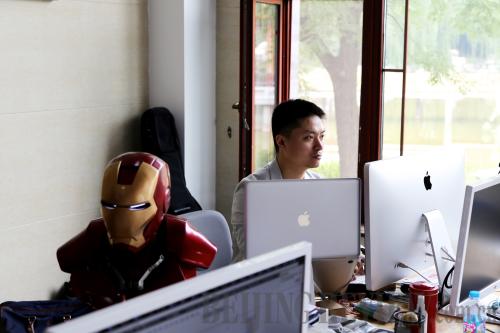|
 |
|
FOCUSED: He Bofei, CEO of Deep Glint, works at his office near the Summer Palace in September 2014 (BY COURTESY OF DEEP GLINT) |
When China's biggest online commerce company Alibaba rang the bell at the New York Stock Exchange on September 19, its CEO Jack Ma thus became the wealthiest man in China. Yang Yong, a senior graduate from Peking University, was on also in the United States at the time, and chose to share his experiences of Chinese-style group funding.
Yang, now President of Peking University's Alumni Venture Association, met with students at Harvard, MIT, Stanford as well as people from Silicon Valley who are interested in Chinese business startups.
With Jack Ma claiming his efforts are to help fledgling entrepreneurs to start a business, Yang retorted that his group's funding plans, which operate in a smarter way, will be just as popular in a few years. Yang added that while Ma's headquarters were in Hangzhou, Zhejiang Province, he had chosen Beijing's Zhongguancun area, which is considered the center of business startups in China.
Business in cafés
Zhongguancun, located in the northeastern Haidian District of Beijing, became a household name in the early 1980s when it was chosen to be built into the "Silicon Valley in China." In 1988, it was officially recognized by the Central Government when they bestowed the title of "Beijing Hi-tech Industry Development Experimental Zone" on it. In 1999, it was renamed the Zhongguancun Science and Technology Zone.
In the 1990s and 2000s, Zhongguancun was packed with buildings filled with vendors selling electronics that would barter with customers. The market boomed for a number of years until online giants like JD.com emerged won customers over with transparency and express delivery, leading to fewer customers for Zhongguancun.
In April 2011, a café opened on the second floor of a shabby hotel in Zhongguancun. The logo was so small that few people on the street would have noticed.
For the first few months, Su Di, the owner of the café talked to every customer stepping in about their goal—to help build a platform connecting investors to startups.
Three months later, while Su was frustrated with the café, a young college student received his first 200,000 yuan ($32,520) from an investor in the café.
Encouraged by this, Su persisted and more cases followed. In February 2012, Haidian authorities named Garage Café an innovative incubator for fledgling startups.
"The decision to make Garage Café an incubator was opposed by some people in the government," said Guo Hong, Director of Zhongguancun Administrative Committee "They said 'how can a café be an incubator?' but after visiting, they changed their opinion."
| 